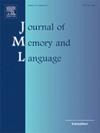Informativity enhances memory robustness against interference in sentence comprehension
IF 3
1区 心理学
Q1 LINGUISTICS
引用次数: 0
Abstract
Language comprehension has been argued to be expectation-based, with more predictable linguistic units being easier to process. However, as a communicative tool, language is often used to deliver messages that are novel and informative, suggesting the necessity of some cognitive mechanisms handling less predictable but more informative content. This paper proposes strategic memory allocation as one such mechanism. Although less predictable linguistic units require greater processing effort for memory encoding, recognizing the inconsistency between top-down predictions and bottom-up perceptual input may signal the working memory system to prioritize these units, enhancing the robustness of their representation against interference. We examine this hypothesis through the lens of the agreement attraction effect in two self-paced reading experiments. In Experiment 1, we find that less predictable but more informative target nouns exhibit weaker agreement attraction in online reading times, especially with more fine-grained measures of predictability such as the surprisal from large language models. This weaker agreement attraction effect for less predictable target nouns confirms our hypothesis that informative linguistic units are prioritized and receive more robust memory representation. In Experiment 2, however, no modulation of agreement attraction emerges when we manipulate the predictability of distractor nouns, suggesting the need for a more nuanced characterization of how information is structured and operated in memory. Our findings highlight an interplay of memory, predictive processing, and implicit learning. We also discuss the implications of our result for memory efficiency and memory compression. More broadly, by demonstrating that the limited memory resources are dynamically optimized for the relevant processing task, the current study highlights a connection to the resource-rational analysis of human cognition in general.
信息性增强了句子理解中对干扰的记忆稳健性
语言理解一直被认为是基于期望的,更可预测的语言单位更容易处理。然而,作为一种交际工具,语言经常被用来传递新颖和信息丰富的信息,这表明一些认知机制处理不太可预测但信息丰富的内容是必要的。本文提出了一种策略内存分配机制。虽然较难预测的语言单元需要更多的记忆编码处理努力,但认识到自上而下的预测和自下而上的感知输入之间的不一致性可能会给工作记忆系统发出信号,优先考虑这些单元,增强它们对干扰的表征的鲁棒性。我们通过两个自定节奏阅读实验中的协议吸引效应来检验这一假设。在实验1中,我们发现不太可预测但信息量更大的目标名词在在线阅读时间中表现出较弱的一致性吸引力,特别是在更细粒度的可预测性指标(如来自大型语言模型的惊讶度)下。对于不太可预测的目标名词,这种较弱的协议吸引效应证实了我们的假设,即信息性语言单位被优先考虑并获得更强大的记忆表征。然而,在实验2中,当我们操纵干扰名词的可预测性时,没有出现协议吸引力的调节,这表明需要对信息在记忆中的结构和操作方式进行更细致的表征。我们的发现强调了记忆、预测处理和内隐学习之间的相互作用。我们还讨论了我们的结果对内存效率和内存压缩的影响。更广泛地说,通过证明有限的记忆资源是为相关的处理任务动态优化的,当前的研究强调了与人类认知的一般资源理性分析的联系。
本文章由计算机程序翻译,如有差异,请以英文原文为准。
求助全文
约1分钟内获得全文
求助全文
来源期刊
CiteScore
8.70
自引率
14.00%
发文量
49
审稿时长
12.7 weeks
期刊介绍:
Articles in the Journal of Memory and Language contribute to the formulation of scientific issues and theories in the areas of memory, language comprehension and production, and cognitive processes. Special emphasis is given to research articles that provide new theoretical insights based on a carefully laid empirical foundation. The journal generally favors articles that provide multiple experiments. In addition, significant theoretical papers without new experimental findings may be published.
The Journal of Memory and Language is a valuable tool for cognitive scientists, including psychologists, linguists, and others interested in memory and learning, language, reading, and speech.
Research Areas include:
• Topics that illuminate aspects of memory or language processing
• Linguistics
• Neuropsychology.

 求助内容:
求助内容: 应助结果提醒方式:
应助结果提醒方式:


